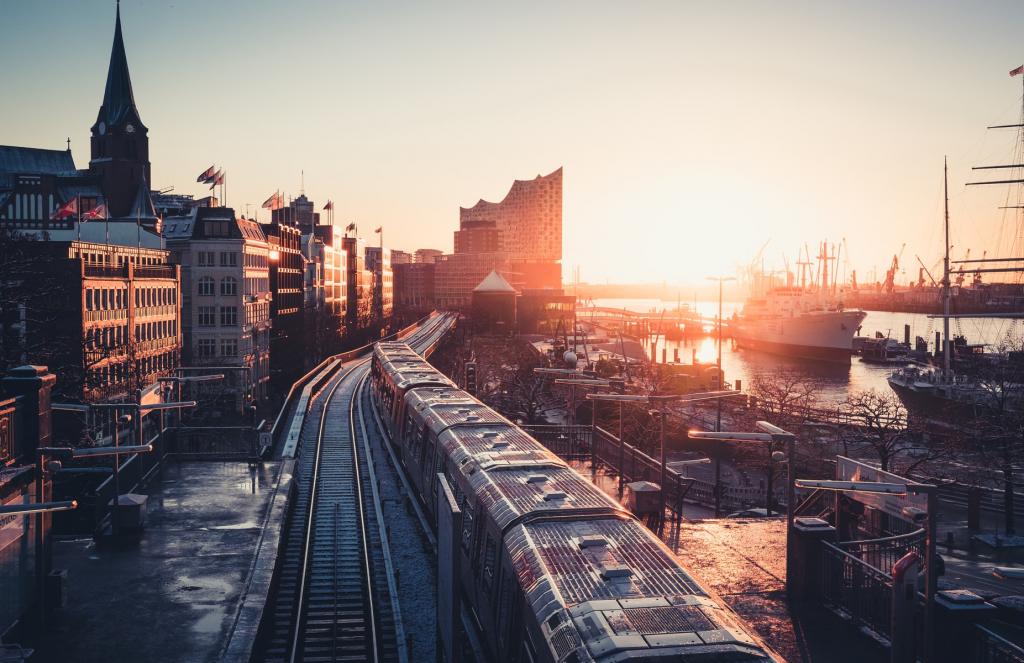Thessaloniki gets ready for its metro launch in November
The underground rapid transit lines have been under construction for almost two decades due to various project delays
 TheMayor.EU logo
TheMayor.EU logo 
The port of Hamburg on the river Elbe currently cervices a lot of freight ships and has rail transport capacity
Authorities revealed their strategy for the next eight years, aiming to foster international cooperation to meet growing clean energy demand in the EU
Last week, authorities in Hamburg announced a new hydrogen import strategy, planning to upgrade the vital port of the Hanseatic city with storage and piping capacity. The idea behind the strategy is to turn the port into a key entry point for green hydrogen imports from abroad.
The plan was presented by the Hamburg Authority for Economy and Innovation (Behörde für Wirtschaft und Innovation) - it seeks to boost the city’s current position on the hydrogen stage. Despite plans to ramp up local production capacity to 550 megawatts by 2030, authorities say that demand is only going to rise.
Moreover, the plan aims to integrate Hamburg into the German national infrastructure and help meet European hydrogen demand as an international hub.
After Germany released its National Hydrogen Strategy in 2020, many regions, particularly in the north have been trying to take centre stage on the push for faster adoption.
These include a massive 2.5 billion euro hydrogen plant in Wilhelmshaven that will be capable of meeting up to 10% of Germany’s energy needs at peak capacity.
The city of Bremen on the other hand has signed a cooperation agreement with Groningen in the Netherlands, whereby the two cities will share experience and resources when developing sustainable energy sources.
The import strategy for Hamburg’s port focuses on building cooperative strategies with exporting countries while expanding local storage and transport capacity. The idea aims to build upon a memorandum between Hamburg and Scotland, signed in late November.
The memorandum promises to increase cooperation and trade in the field of green hydrogen. Now, authorities are eyeing the possibility of similar agreements with Denmark, Norway, Australia and Chile, among others.
The first step will be to conduct a thorough analysis of North Germany and plan for potential demand and import capacity until 2023. After that, the plan proposes the creation of a European funding body, geared towards hydrogen investment, as well as state funding schemes.
Next, they propose that by 2025 Hamburg secures at least six letters of intent from other countries or regions outside of Germany, which can ramp up hydrogen production.
Furthermore, in terms of infrastructure on the ground, apart from pipelines, authorities want to make the existing rail connections suited for transport. They will launch an economic viability study into this idea by 2023.
In terms of pipelines, Hamburg and the German state of Schleswig-Holstein are preparing for joint talks with Denmark to participate in the import of green hydrogen destined for industry and to connect both states to the Danish pipeline network.

The underground rapid transit lines have been under construction for almost two decades due to various project delays

Now you can get your wine in Talence by paying directly in Bitcoin

That’s because the state has to spend money on updating the railway infrastructure rather than subsidizing the cost of the popular pass

Rethinking renewable energy sources for the urban landscape

The examples, compiled by Beyond Fossil Fuels, can inform and inspire communities and entrepreneurs that still feel trepidation at the prospect of energy transition

Now you can get your wine in Talence by paying directly in Bitcoin

The 10th European Conference on Sustainable Cities and Towns (ESCT) sets the stage for stronger cooperation between the EU, national and local level to fast track Europe's transition to climate neutrality.

At least, that’s the promise made by the mayor of Paris, Anne Hidalgo

The underground rapid transit lines have been under construction for almost two decades due to various project delays

At least, that’s the promise made by the mayor of Paris, Anne Hidalgo

Hostal de Pinós is located in the geographical centre of the autonomous region

Despite its church-y name, the district has long been known as the hangout spot for the artsy crowds

Urban dwellers across the EU are having a say in making their surroundings friendlier to people and the environment.

Forests in the EU can help green the European construction industry and bolster a continent-wide push for architectural improvements.

Apply by 10 November and do your part for the transformation of European public spaces

An interview with the Mayor of a Polish city that seeks to reinvent itself

An interview with the newly elected ICLEI President and Mayor of Malmö

A conversation with the Mayor of Lisbon about the spirit and dimensions of innovation present in the Portuguese capital














